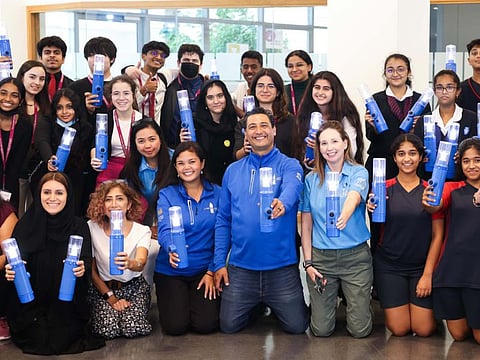Dubai students’ sustainability message to be seen by world leaders at COP27 climate summit in Egypt
Artwork made of solar lights to be displayed at base of the Great Pyramids of Giza

Dubai: Students and parents at GEMS Wellington Academy–Silicon Oasis in Dubai joined the ‘Light It Forward’ campaign and created solar lights that will be turned into artwork and installed at the base of the Great Pyramids of Giza as a message to world leaders at the upcoming COP 27 climate summit in Egypt.
More than 60 students, parents and school staff joined the campaign initiated by non-profit organisation Litre of Light. The solar artwork will be installed at the base of the Great Pyramids of Giza at the 27th Conference of the Parties to the United Nations Framework Convention on Climate Change (COP 27) from November 6 to 18.
Sarah O’Regan, principal and CEO at GEMS Wellington Academy–Silicon Oasis, told Gulf News: “We are proud to be chosen as the first school in the UAE to take part in the Litre of Light initiative. By participating in such an innovative and important project, our students and parents had the opportunity to create solar lights that will be displayed at COP 27 and, more crucially, light up the homes of underprivileged families in Egypt.”
She added: “COP is the UN-sponsored climate change conference where world leaders and cabinet members convene to take action on the climate crisis the world is facing. In addition, this event is the launch to lead up to the COP 28 conference which will be held in Dubai in 2023. This will help voices of our student in the UAE to be represented in the global climate action movement.”
Bottle of hope
Filipino social entrepreneur Illac Diaz, founder of Litre of Light, gave a pep talk on the net zero campaign for climate action and also taught the participants how to create solar lights from a recycled bottle.
Diaz said Litre of Light is a “global, grassroots movement committed to providing affordable, sustainable solar light to people with limited or no access to electricity”.
He added: “Through a network of partnerships around the world, Litre of Light volunteers teach marginalised communities how to use recycled plastic bottles and locally sourced materials to illuminate their homes and streets.”
The organisation - which is the recipient of 2015 Zayed Future Energy Prize Award as well as the 2016 St Andrews Prize for the Environment, and 2014-2015 World Habitat Award - has installed more than 350,000 bottle lights in more than 15 countries, including Philippines, India, Pakistan, Kenya and Brazil.
The non-profit organisation has developed four very simple solar lights, including a solar lamp, house light, streetlight, and bottle light, that use recycled plastic bottles and other affordable materials that can be sourced locally in any part of the world.
Seminal moment
The founder of Litre of Light has a good relationship with the UAE. Diaz earlier said: “Winning the Zayed Sustainability Prize was a seminal moment in the organisation’s trajectory. It allowed us to scale our operations across more than 30 countries, spanning every continent. We were also connected to thought leaders in sustainability and clean energy who helped us to think through how to improve our technology, and partner with us in our community-based work. Finally, we were given access to incredible platforms to share our impact story from the Philippines around the world.”
In 2020, Litre of Light launched the Light It Forward digital challenge, which invited people from all over the world to contribute to the UN Sustainable Development Goals (SDGs) by building solar lights from the safety of their homes. Volunteers built solar lights which they donated to needy communities.
Litre of Light volunteers make portable solar lights which have low up-front costs, require little maintenance, and can provide much needed light in remote, off-grid areas. Litre of Light provides a 1-watt LED with micro-solar panels and battery that would provide 10 hours of light at night for $10 each (Dh36.50), or a 2-watt light for $15 (Dh54.75). Their daytime light solution, which illuminates dark rooms in poor communities, is made using only a plastic bottle, water and 10ml of bleach (to prevent algae growing) for $1 (Dh3.65).



